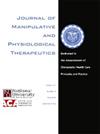儿童和青少年体育活动与人体测量之间的相关性。
IF 1.4
4区 医学
Q4 HEALTH CARE SCIENCES & SERVICES
Journal of Manipulative and Physiological Therapeutics
Pub Date : 2024-01-01
DOI:10.1016/j.jmpt.2024.08.013
引用次数: 0
摘要
研究目的本研究的目的是测量儿童和青少年的体力活动水平和久坐情况与人体测量之间的关系:这项横断面描述性研究的样本来自巴西伊塔佩维(Itapevi-SP)公立学校的 400 名儿童和青少年。体力活动核对表访谈或LAF "Lista de Atividades Físicas"(巴西版)是在上学日通过面对面访谈的方式进行的,可以对前一天的久坐行为和体力活动进行评估。人体测量包括体重、性别、年龄和下肢姿势。对参与者的正面和矢状平面进行拍照,并使用姿势评估软件(PAS/SAPO)对照片进行分析。采用皮尔逊检验分析相关性:儿童和青少年的膝外翻趋势随着体重的增加而增加(r = -0.33)。平均而言,女孩的 Q 角更大。随着年龄和体重的增加,踝关节外翻的可能性较小(r = -0.18 和 -0.23)。骨盆的水平排列大多呈内翻状态,随着年龄的增长而显著增加(r = 0.27),随着体重的增加而略有增加(r = 0.15)。从 10 岁开始,膝关节和踝关节的过度伸展和背屈的趋势都有所减弱,但与其他变量没有相关性。体力活动时间和久坐行为与上述姿势角度之间没有明显的关系:结论:虽然年龄、性别和体重与姿势角度,特别是骨盆排列、Q角、膝关节、踝关节、性别和体重之间存在相关性,但体育活动时间、久坐行为和下肢姿势之间没有相关性。本文章由计算机程序翻译,如有差异,请以英文原文为准。
Correlation between physical activity and anthropometric measurements among children and adolescents
Objectives
The purpose of this study was to measure the association between the level of physical activity and sedentary conditions with anthropometric measurements of children and adolescents.
Methods
This cross-sectional descriptive study consisted of a convenience sample of 400 children and adolescents from public schools in Itapevi-SP, Brazil. The Physical Activity Checklist Interview or LAF “Lista de Atividades Físicas” in a Brazilian version, was administered in a face-to-face interview on a school day and allowed assessment of sedentary behavior and physical activity on the previous day. Anthropometric measurements included body weight, sex, age, and lower limb posture. The participants were photographed in the frontal and sagittal planes, and the photos were analyzed using postural assessment software (PAS/SAPO). Pearson's tests were applied to analyze correlations.
Results
Children and adolescents show a greater tendency toward valgus knees with increasing body mass (r = ‒0.33). On average, girls have a larger Q angle. Ankles are less likely to become valgus with increasing age and mass (r = ‒0.18 and ‒0.23, respectively). The horizontal alignment of the pelvis is mostly in anteversion with a significant increase with age (r = 0.27) and a slight increase with mass (r = 0.15). The knee and ankle tend to be less hyperextended and more dorsiflexed from the age of 10, with no correlation with the other variables. It was not possible to observe a clear relationship between the time spent in physical activity and sedentary behavior and the postural angles mentioned above.
Conclusion
Although correlations were found between age, sex and body mass, and postural angles, notably pelvis alignment, Q angle, knee, ankle, sex, and body weight, there was no correlation between the time spent in physical activity, sedentary behavior, and lower limb posture.
求助全文
通过发布文献求助,成功后即可免费获取论文全文。
去求助
来源期刊
CiteScore
3.00
自引率
7.70%
发文量
63
审稿时长
29 weeks
期刊介绍:
The Journal of Manipulative and Physiological Therapeutics (JMPT) is an international and interdisciplinary journal dedicated to the advancement of conservative health care principles and practices. The JMPT is the premier biomedical publication in the chiropractic profession and publishes peer reviewed, research articles and the Journal''s editorial board includes leading researchers from around the world.
The Journal publishes original primary research and review articles of the highest quality in relevant topic areas. The JMPT addresses practitioners and researchers needs by adding to their clinical and basic science knowledge and by informing them about relevant issues that influence health care practices.

 求助内容:
求助内容: 应助结果提醒方式:
应助结果提醒方式:


